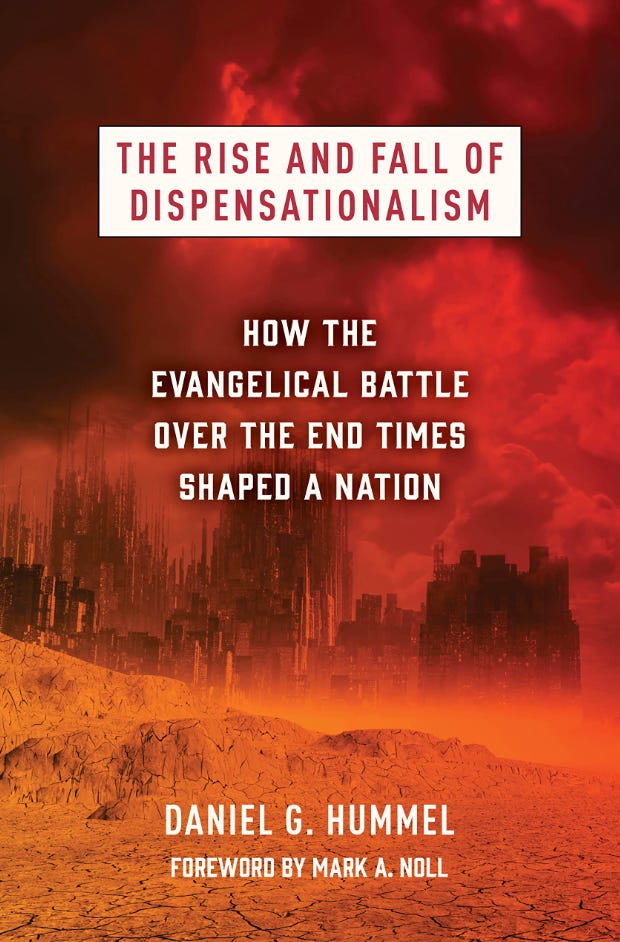Dispensationalism Becomes Official
Dispensationalism became official, what Daniel G. Hummel calls “scholastic” dispensationalism, when Lewis Sperry Chafer (pronounced with an “sh”) published his 8 volume systematic theology. The story is told with verve by Daniel G. Hummel’s The Rise and Fall of Dispensationalism: How the Evangelical Battle over the End Times Shaped a Nation. Somehow during college I acquired a set of Chafer, read a few of its volumes, but it has not survived the many cuts my library has experienced.
Fundamentalists divided somewhat over major concerns: national culture led by W.B. Riley or a more systematized dispensationalism as led by Chafer. This theology combined “new premillennialism, Higher Life teachings, and shared fundamentalist teachings.” As a college student Chafer’s higher life teachings were still in print in separate, small volumes.
The more cultural fundamentalists formed a battle, “a struggle for the faith that demanded harsh words, clear enemies, and stark boundaries.” Hummel uses Billy Sunday here as an example. The scholastics gathered into their quiet corner names like Arno Gaebelein, Reuben Torrey, and James M. Gray, along with G. Campbell Morgan and F.B. Meyer.
Chafer was a protégé of CI Scofield, and was a Southern Presbyterian. He became, however, more of an interdenominational teacher and promoter of his dispensationalism. A major move happened when in 1922, in Atlanta, a group decided to form a “high-grade theological school.” Originally called Evangelical Theological College in 1924, by 1936 it was called Dallas Theological Seminary. They were not PhDs but Bible teachers in English. Hence, that stayed a part of the seminary and still is a degree program at DTS. DTS became denominationally unaffiliated and eventually shaped the Bible Church movement. It also began publishing Bibliotheca Sacra, and I have over the years read many an article in BibSac.
Chafer’s theology was published in 1947. At the heart of dispensationalism, though one does not know this as a distinctive when it comes to most discussion, is that “throughout the ages God is pursuing two distinct purposes: one related to the earth with earthly people and earthly objectives involved [Israel], while the other is related to heaven with heavenly people and heavenly objectives involved [church].” This radical distinction between Israel and the church characterizes dispensationalism to the core.
Which means covenant theology is the alternative, and it was not long before covenant theologians reacted to Chafer to form polemical edges. Hard for me to believe many don’t know these names, but we are talking about names like A.W. Pink, Philip Mauro, G. Campbell Morgan, and Oswald T. Allis.
And J. Gresham Machen’s Westminster seminary breakaway from Princeton needs to be factored in here as well.
The problems with dispensationalism were four-fold:
First the historical provenance of dispensationalism was rooted in the Exclusive Brethren, and hence did not have church history or tradition in its corner.
Second, covenant theologians were totally against the idea of God's two distinct purposes, one for Israel and one for the church. The emphasis for covenant theologians was continuity based upon the Abrahamic covenant.
Third, Teaching by Chafer was called free grace which meant salvation was acquired simply by acknowledging Jesus as one Savior. This is still around, and gets play among the Bible churches, but the covenantalists were insistent upon a higher standard of faith and obedience. In my early professor years Charles Ryrie and John Macarthur got into it on this one. (I sided with the latter.) Covenantalism saw free grace as the thinning of the doctrine of salvation and of discipleship.
Fourth, a big issue was the Kingdom of God, and the issue also involved the two distinct purposes of God, one for the church and one for Israel. Inaugurated eschatology, as taught by Ladd and first given as lectures at a dispensational seminary in the PacNW (I believe), was repudiated at DTS. Not so much today.
Dispensationalists responded with a fury of publications. The names were Charles Feinberg, father of Paul and John of TEDS renown; Dwight Pentecost, who wrote the textbook on it called Things to Come; Charles Ryrie, who condensed Chafer into Dispensationalism Today; and then John Walvoord. Another name but less known is Alva J. McClain, who modified Chafer in that he “dulled the stark dualism between heaven and earth for the sake of a more literal interpretation of scripture.” Add Talbot seminary as the West Coast version.
Hummel then explores what he calls “fusionism,” a term I’ve not heard before. We’re talking about Harold Ockenga, Carl Henry, and George Ladd. They were halfway between modernism and fundamentalism, but these scholars also fused premillennialism with covenant theology. The institution for this was Fuller Theological Seminary, and these scholars acquired the name “neoevangelical.”
Ladd was the leading polemicist for the fusion, and he too became a strong critic of dispensationalism. Add to this the names of Daniel Fuller, Edward Carnell, A.W. Tozer, JI Packer, and John Stott – none embraced dispensationalism of the DTS variety.
As Hummel puts it, though, “controversy grew rather than shrunk dispensational influence, with its key ideas gaining currency far beyond the halls of learning.”




In the 1930s my pastor preached dispensationalism as the only way to read and understand the Bible. As a kid in the pew I struggled with the implications being drawn there that all those other churches that did not preach this were not just in error, but were deliberately misleading their people who would end up in hell. OUCH! I struggled with these implications until at age 14 I dumped the whole thing. Thanks, Scot, for this historical explanation that caused me so much misery in childhood. These teachings were not merely another acceptable way to read the Bible; they damned too many good people to hell with their exclusive "understanding" of Scripture.
My wife’s family are devout” Bible Students” , I believe is a break off of Jehovah witnesses. Their thing is just as confusing as what has gone on in the church. They believe only those that study diligently the scriptures will go to heaven, All 144,000 , that thinking made my wife and her mother great sadness and pain.
I have always wondered why Christianity was so hard to believe and be a part of. I am a Christ follower plain and simple. I appreciate your giving us a history lesson, I appreciate your writings .